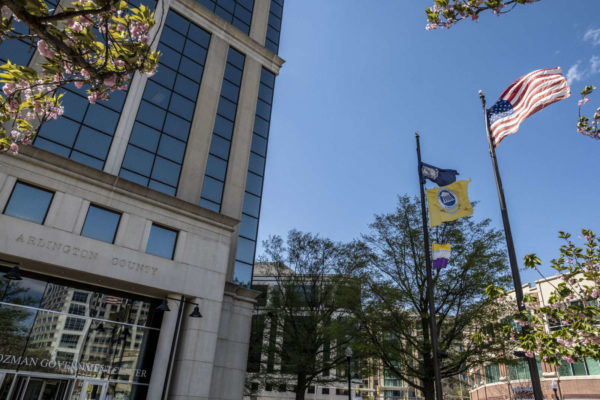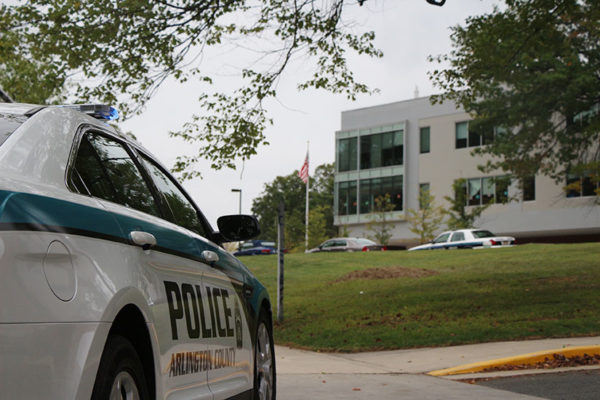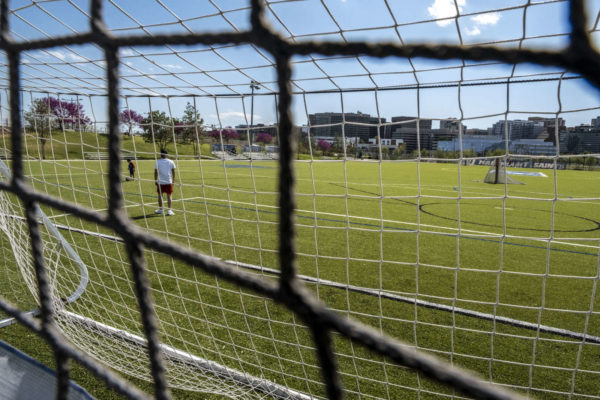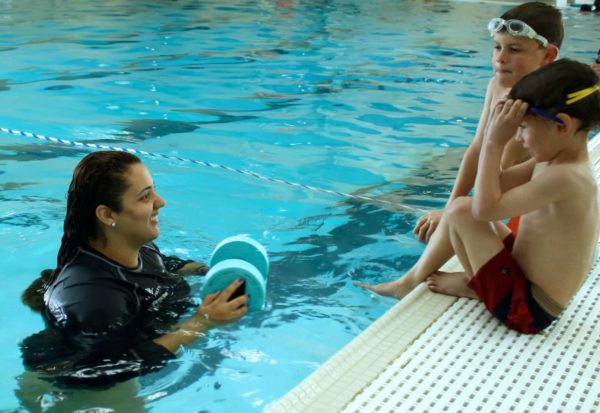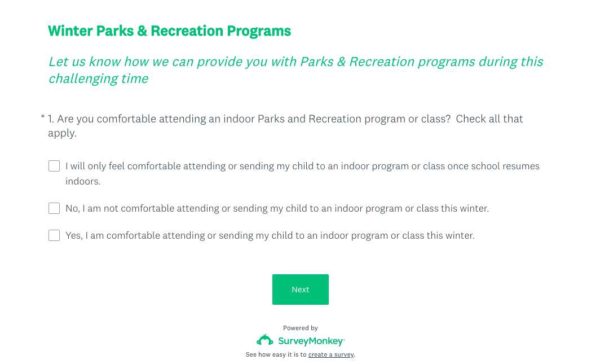
A new program diverting teens from the criminal justice system has seen 27 referrals for a variety of criminal offenses, largely related to theft, assault and drug and alcohol violations.
Shoplifting and physical disagreements with peers are exactly the kinds of crimes Devanshi Patel expects to see go through the program, run by the nonprofit she leads called the Center for Youth and Family Advocacy (CYFA).
The organization is one of two in Arlington County attempting to keep juveniles out of the criminal-legal system — the other being Restorative Arlington. Leaders of both say they offer an alternative to the traditional, adversarial court process that takes into account the needs of victims of crimes as well as the youth who commit them.
“When a kid has a relational issue, whether it’s with a peer or family member, there are better ways to help that kid understand what is going on or why they’ve engaged in that type of response or where their actions come from… so they don’t make that same decision again in the future,” says Patel, who is also a substitute judge in Arlington. “This type of program is different because we’re not using the legal system to provide those resources.”
Between August and October, CYFA reports ACPD responded to 71 incidents of youth-based harm, of which 24 involved offense types not eligible for referral to CYFA and another 21 that were not referred. In 13 eligible cases, the victim wished to seek legal redress through the courts.
CYFA received 13 referrals, of which 11 came from ACPD, before the juveniles were charged while two came from the Arlington Juvenile Court Services Unit, after they were charged. Since then, the total number of referrals has gone up to 27, as of this month.
Of the cases CYFA has opened, nine have been closed.
“We’re actually a little surprised at how well it’s gone,” said ACPD Deputy Chief Wayne Vincent, in a recent video CYFA produced.
“Some people may argue, ‘Well, just hold them accountable and send them off to the detention center or have the courts deal with it,'” he continued. “It’s very traumatizing. I think the studies are very clear that you know, the less that we can have a child go through the criminal justice system, at least in the early stages, I think the better for them.”
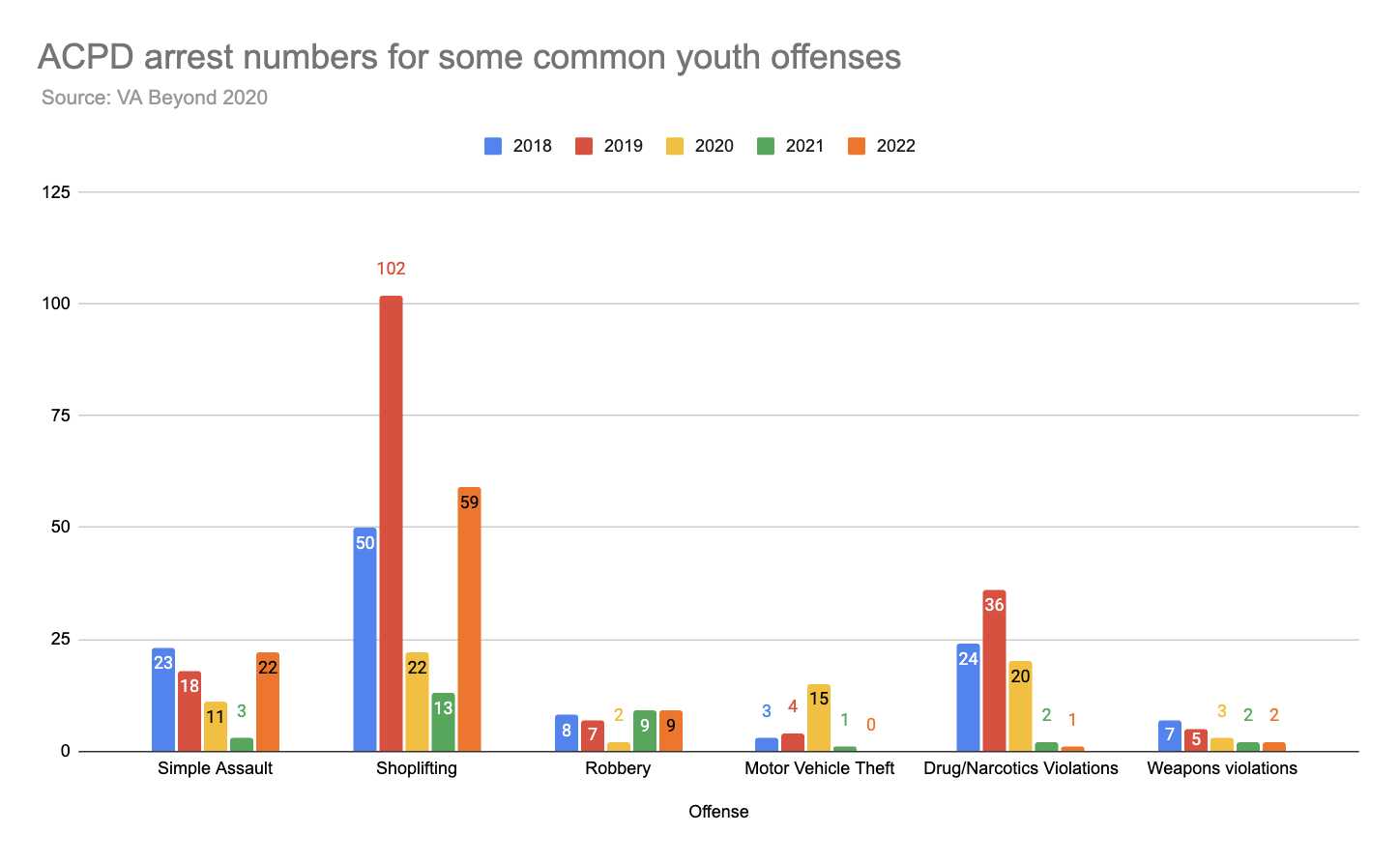
So far, CYFA has received $100,000 from Arlington County to support this work. For the last few years, the county has involved itself in the creation of programs that use restorative justice principles, such as voluntary conferencing between victims and offenders, to divert young people from the criminal-legal system, before or after they have been charged with a crime.
It stood up Restorative Arlington, now a separate nonprofit, and funneled support to community-based programs, including that of CYFA.
The county says its backseat role allows it to also fund a broader range of “innovative programs that further advance restorative justice.”
Restorative Arlington offers conferencing while CYFA offers both conferencing and a “Youth Peer Court” program, where participants sit down with “peer ambassadors” who take the positions of defense attorney, prosecutor and judge. There are at least one thousand different peer courts across the country but some practitioners say conferencing is truer to the roots of restorative justice than peer courts that borrow the structure of the judicial system.

Arlington County is looking to tweak how its athletic fields are used and reserved.
Through Sept. 8, residents will have the chance to participate in a survey which county staff plan to use to develop policy that will “ensure more equitable access for recreation.”
The study is part of the Public Spaces Master Plan which calls for the county to solicit feedback from residents every five years on how frequently and at what times of day people use the fields.
The county started gathering feedback in 2021 and surveyed 107 people which was used to create an “Athletic Field Draft Availability Framework.”
In the initial survey, residents highlighted that there was not enough time and space dedicated to unscheduled casual “drop-in” or “community use” of athletic fields for community activities and requested better access to lighted fields — currently 36 out of 96 fields have lights — on weeknights and weekends.
The issue of access to athletic fields for unplanned athletic and non-athletic activities has become increasingly contentious in recent years.
Before it was adopted in 2019, the Public Spaces Master Plan came under fire from opponents who argued the county had set aside more space for athletic fields than it needed, reducing the amount of available land for other facilities, such as parks and schools.
In 2021, the Aurora Highlands Civic Association wrote numerous letters to the Arlington County Board and circulated a petition pushing for “open access” to nearby diamond athletic fields during hours when there are no scheduled games “to relax, throw frisbees, sunbathe, or even write petitions.”
However, proponents claim demand for scheduled use of sports fields is growing and believe the county should invest to help solve this problem.
To resolve these issues, Jennifer Fioretti, deputy director of Arlington’s Department of Parks and Recreation, said county staff have proposed two solutions via the Athletic Field Availability Draft Framework.
First, staff have developed a formula that calculates the “utilization rate” for each field in the county. Fioretti said she believes this strategy will help the department better understand individual field use, thereby improving “operational efficiency.”
“We will use the data, for example, to inform the re-balancing of scheduled activities and to create opportunities for community use that may have not been available in the past,” she told ARLnow in an email.
Second, county staff propose reclassifying the six fields currently labeled as “Drop-In/Community Use” to a “Permit Takes Priority” status.
Fioretti said the six drop-in fields, which include Gunston 3, Barcroft 5, VA Highlands 2, Westover, TJ Lower Field and Rocky Run, can still be reserved, which causes confusion because “Community Use/Drop-In” implies there are no activities scheduled.
The idea, she noted, is to “further simplify our field designations” in order to “spread scheduled community time throughout the County.”
“By eliminating the Drop-In/Community Use designation we will be identifying community time and scheduled sport specific times at more locations throughout the entire county,” Fioretti said.
Of Arlington’s 96 athletic fields, 12 are currently “Permit-Only,” 78 are “Permit Takes Priority,” and 6 are “Drop-In/Community Use fields.”
By participating in the second survey, residents will have the opportunity to provide feedback about the proposal which Fioretti said will help county staff determine whether it is “on the right track” or whether its proposal needs to be modified.
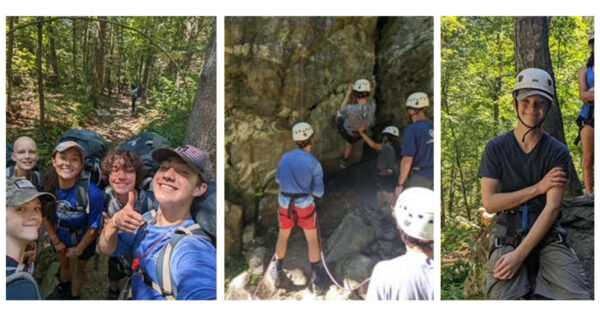
A nonprofit with ties to Arlington is offering free outdoor hiking and camping adventures for D.C.-area teens and tweens grieving the loss of a loved one.
Hope for Grieving Families is partnering with the educational nonprofit Outward Bound to send up to 30 tweens and teens on a one-day ropes course adventure and a group of eight to 10 high schoolers on a seven-day expedition in the Appalachian Mountains.
The deadline to apply for both programs is next Friday, May 19.
The program does not aim to provide counseling, but rather, an opportunity for teens to befriend feeling similar emotions.
“The friendships that have blossomed between these teens are so amazing,” Tara O’Brien, the executive director of Hope for Grieving Families, tells ARLnow. “It makes you feel like you’re doing something that means something, that is still impacting these families’ lives.”
In a press release, the nonprofit said one in 13 children will lose a parent by the time they are 18 and one in five will lose someone close to them by 18 — and that these children will experience grief differently than adults.
“For kids who have faced the immensely painful loss of a parent, sibling, or other loved one, the chance to connect with each other out in nature is an unforgettable, healing experience,” O’Brien said in a statement.
“Our participants learn from our guides and from one another, building resilience and self-advocacy skills,” she continued. “Most of all, these trips are an opportunity for grieving children to just experience some fun again, alongside other kids who are going through the same journeys of loss and healing.”
Jason Alford, of Outward Bound, says research shows most children who have experienced loss benefit from peer-to-peer support.
“Children can experience comfort from having others who understand grief and loss. Without a peer support group, children can feel anxious, isolated and overwhelmed,” he said in a statement. “Our expedition program with Outward Bound was designed with these evidence-based insights in mind.”
Hope For Grieving Families says it is the D.C. area’s only organization providing “family-focused grief programming” aimed at giving people new, positive memories and experiences after a loss.
Its founder, Becky Wagner, lives in Arlington and the nonprofit serves many from North Arlington and Northern Virginia more broadly, O’Brien said.
Clients come to the organization for a range of reasons, O’Brien tells ARLnow. Many have lost someone to suicide or a car accident, while for others, family members died after a bout with cancer.
“The thing that bonds them all is that they all understand they’re going through a grieving process,” she said. “They might not talk about the grief but they all understand what they’re going through.”
The nonprofit focuses on creating fun experiences for teens processing their grief. O’Brien says it is sensitive to current events that may trigger that grief, such as a recent shooting at a mall in Allen, Texas.
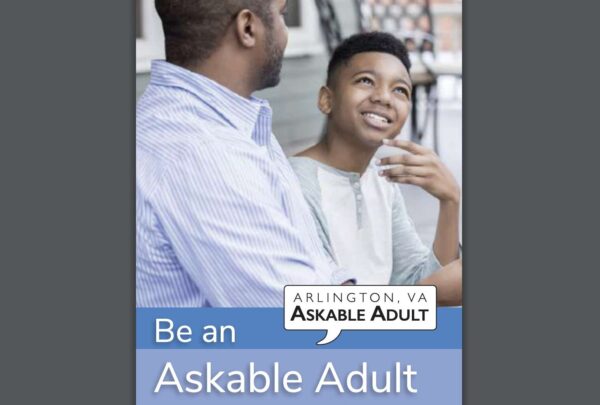
Arlington County is launching an initiative to make sure all kids have a trusted adult they can talk to.
Dubbed the “Askable Adult initiative,” the program will help to provide “access to adults who listen, provide support and understanding, and answer questions without judgment,” according to a press release.
It is being launched by Project PEACE, the county’s effort to respond to intimate partner and sexual violence, after a recent Arlington Public Schools survey revealed that fewer than half — 42% — of middle and high school students “talk with an adult at home about what matters to them most frequently or almost always.”
A series of workshops are scheduled this fall, starting on Saturday, Sept. 17, for adults interested in helping to support middle and high school-aged youth. The initiative will also be promoted at this week’s Arlington County Fair.
The full press release about the initiative is below.
Access to adults who listen, provide support and understanding, and answer questions without judgment increases youth resiliency. It’s with this goal that Arlington’s Project PEACE is launching the Askable Adult initiative to ensure every young person in Arlington County has at least one supportive parent, caregiver, or other adult–an “askable adult”–in their life.
Project PEACE, Arlington’s Coordinated Community Response to Intimate Partner and Sexual Violence, and its partners believe that everyone has a role to play in supporting the health and well-being of children and youth in our community. The most common factor for youth who develop resilience to stress and adversity is having at least one stable and committed relationship with a supportive parent, caregiver, or other adult.
The U.S. Surgeon General recently announced that youth mental health is a national public health crisis. Mental health struggles increase in times of stress, and stressors have skyrocketed with the impacts of the COVID-19 pandemic. Fortunately, the same prevention strategies that promote mental health–such as helping youth feel connected–help prevent a range of negative experiences, such as child abuse, bullying, suicide, and violence. Ultimately, youth challenges cannot be addressed solely in isolation but rather through the shared efforts of young people, their families, local communities, private organizations, and all levels of government.
An askable adult is an individual a young person has identified as willing and able to listen, provide support and understanding, and answer questions without judgment. Askable adults encourage positive youth development so that they are empowered to reach their full potential.
The latest data from Arlington Public Schools’ Spring 2020 6th-12thGrade Student Survey reveals that only 42% of Arlington middle and high school students talk with an adult at home about what matters to them most frequently or almost always. The Askable Adult initiative aims to help adults in Arlington step into that role.
The Arlington Askable Adult initiative includes the following components:
- Ongoing Becoming More Askable workshops beginning this fall to support hands-on learning for individuals, groups, and organizations.
- An Askable Adult mobile brochure, published by Project PEACE and its partners Second Chance and the Arlington Foundation for Families and Youth, offers strategies to strengthen skills for being askable and provides local resources to aid in the journey. The brochure is accessible in four languages (English, Spanish, Mongolian, and Amharic) and can be distributed freely to any community.
- A website with regularly updated information, resources to enhance skills and strengthen support, and ways to become involved with the Askable Adult initiative.
The Arlington County Askable Adult initiative will launch to the public at the 2022 Arlington County Fair during the weekend of August 19-21.
About Project PEACE:
Arlington County’s Project PEACE (Partnering to End Abuse in the Community for Everyone) is a coordinated response dedicated to advancing the most effective and efficient array of education, prevention, protection, and support services to end intimate partner and sexual violence in the Arlington community.
Image via Arlington County
Arlington County has created a new youth program aimed at diverting young people who commit crimes from the criminal justice system.
The program, called “Heart of Safety,” is the first county program established to find alternatives to prosecution in certain misdemeanor and felony cases committed by juveniles and young adults, according to a press release from the Office of the Commonwealth’s Attorney.
Parisa Dehghani-Tafti, the top prosecutor for Arlington and the City of Falls Church, announced today (Tuesday) that she signed a Memorandum of Understanding with Arlington Juvenile and Domestic Relations Court Services Unit and a county initiative called Restorative Arlington to found Heart of Safety.
Restorative Arlington began in 2020 to introduce to the public schools system, legal system and community new ways of holding people accountable for their crimes without putting them through the court process.
The founders of Heart of Safety say it will give victims a say in what they need to feel that justice has been served, while holding those who committed the crime accountable and reducing future crimes in the long run.
“Heart of Safety is about survivors’ rights, youth rehabilitation, and crime prevention; for survivors, it’s the peace of mind of taking charge of their recovery; for young people, it’s a second chance to make right what they did wrong; and for the community, it’s an investment in crime prevention,” said Dehghani-Tafti, who campaigned on a justice reform platform in 2019.
People who commit crimes and victims can volunteer to resolve their case through a conferencing process. Either the victim or the person who committed the crime must be 26 or younger when the incident took place to participate.
Cases have to be identified and deemed appropriate for the conferencing process, which is overseen by a trained facilitator. This person talks with both parties to listen to their experiences, understand what they need and determine if they should meet. If so, the facilitator brings the participants together to draft a restoration plan and follows up with them later to ensure they completed the plan and are satisfied with the outcome.
If this process doesn’t resolve the case, the Commonwealth’s Attorney can open a prosecution case.
“Heart of Safety embodies the priorities and interests of our community and is in full alignment with best practices in restorative justice diversion,” Restorative Arlington Executive Director Kimiko Lighty said. “We are grateful to be able to offer this long-awaited option for people who have been harmed in our community.”
Restorative Arlington worked with volunteers — victims of crimes, formerly incarcerated persons, teens and young adults — over the course of two years to establish Heart of Safety, according to the county.
Leaders of Restorative Arlington, meanwhile, are working with Arlington Public Schools to draft an agreement that would allow schools to refer students directly to Heart of Safety. The county says this will allow schools to hold students accountable for wrongdoing while keeping them out of the criminal justice system.
“Restorative Arlington’s Heart of Safety program will provide a great new option for diverting some youth from the traditional court process,” said Earl Conklin, Juvenile and Domestic Relations Court Services Unit Director. “It is an alternative model that has proven successful for both the youth and those who have been harmed.”
With a flurry of touchdowns, an Arlington girls flag football team won the NFL Flag Football National Championship in Las Vegas this past weekend.
The Virginia Hurricanes, a team made up of sixth grade girls mostly from Arlington, dominated the competition in their age range during the six game tournament. The team routed their opponents during the tournament by a combined score of 96 to 8.
The team has been playing together for about three years. That continuity and cohesion is what makes this group special, the players tell ARLnow.
“We have all the right pieces. So, when it all fits together and is working, it feels like we could beat anyone,” quarterback Zoe Connor says.
Receiver Adriana Ordenes agrees, saying it’s the sometimes unquantifiable traits that can turn a good team into a great one.
“It’s a team sport. There’s not just one player that does everything,” Ordenes says. “Everybody is working together.”
Coached by Mike Rivera, this isn’t the first time the Virginia Hurricanes has won or participated in the national championship. In fact, two other girls teams he oversees — including the Virginia Girls 14U and the 12U squads — made it to this year’s tournament as well in Vegas, also playing extremely well. Additionally, he runs a program for girls basketball teams.
But Rivera says the sixth grade Hurricanes were particularly successful due to that togetherness.
“They just have a lot of good team chemistry,” he says. “They’re great kids who get along well and are so supportive of one another. They are very unselfish.”
The tournament is sponsored by the NFL, with each team representing an NFL franchise. The Virginia Hurricanes won the regional tournament in New Jersey in June, so they went to Las Vegas representing the New York Jets. The NFL team provided apparel, jerseys, and brand new cleats to the players.
Like any great team, they did overcome some challenges along the way. Lyla Kelly, who plays cornerback on defense and center on offense, has cystic fibrosis, which landed her in the hospital at times during the season. But she says that her teammates always picked her up by checking on her and not missing a beat when she couldn’t be on the field with them.
“It’s so welcoming and everyone always supports me with everything,” Kelly says. “There’s not one person who treats me any differently.”
Her teammates agree.
“Lyla is such a great athlete and teammate. Nobody really notices [that she has cystic fibrosis] all that much,” Connor says. “On our team, she’s just a really good player. And a really good friend.”
The teammates talk about how Coach Mike Rivera, who lives in the Woodmont neighborhood, makes the sport fun for them, but also knows that he’s focused on the same thing they are: winning.
“Coach Mike… makes it so much fun, but the [coaches] don’t make too much fun so that we all goof around. We get serious,” says Ordenes. “And I love winning.”
When the final whistle was blown and the Virginia Hurricanes knew the championship was theirs, they celebrated by “screaming and jumping around” and drenching their coaches with water blasters (the tournament was also sponsored by Nerf).
But Kelly, Connor, and Ordenes all say that their work isn’t done yet. Sure, winning one championship is nice, but they hope that bond they have will help them win again next time.
“We just get each other,” Ordenes says. “We’ve been playing with each other for so long that we know each other’s strengths and weaknesses. We all help each other out on the field.”
(Updated 4:20 p.m.) Against the backdrop of Alexandria’s City Council voting to reinstate School Resource Officers, Arlington school and police officials say they’re confident kids and staff will be safe without daily police presence.
That’s because, leading up to the decision to remove SROs this summer, the county spent six years investing in other school safety pillars, adding counselors, enhancing building safety and beefing up emergency management operations, according to School Board Chair Barbara Kanninen.
When the School Board ended the program — out of concern for racial disparities in juvenile arrests — they did so knowing that staff could handle regular student disruptions without involving law enforcement, she said.
“I believe that background made us uniquely well-situated to think about the next step regarding SROs,” she said last night (Wednesday) during a discussion hosted by the Arlington Committee of 100 on school safety without SROs.
“It’s difficult talking about different jurisdictions in a harsh way, but the fact is that the Alexandria superintendent didn’t recommend removing SROs from schools for the simple fact that they didn’t believe they had the resources in place,” Kanninen continued. “They felt they needed SROs for safety.”
The discussion, which addressed current police engagement efforts and Arlington’s Restorative Justice program, couldn’t have been more timely. Not only did unsafe conditions in Alexandria schools lead the City Council to reinstate SROs this week, but also, APS recently had two safety-related incidents in which police got involved.

On Friday, allegations of sexual battery during Yorktown High School’s Homecoming football game resulted in a police investigation. Last Wednesday, police responded to false claims of a school shooter at Washington-Liberty High School.
As for Alexandria, Kanninen emphasized the fact that City Council narrowly voted to remove SROs against advice from the School Board, which voted 6-3 to keep them.
“We’re in a different situation,” Kanninen said. “We believe we have the resources and supports in place to keep kids safe as possible.”
In unsafe situations such as fights, she said APS has staff trained in defusing those situations and prefers this approach to introducing kids to the juvenile justice system.
“We don’t want their first interaction to be with a police officer,” she said.
Still, Kanninen said administrators will call 9-1-1 any time there’s a safety threat. For example, police were called to Washington-Liberty High School over the school shooter claim, conducted an investigation, found no threat and gave the “all clear” later that morning.
“Just like any other building, organization, or anyone in Arlington, if something happens, we’re going to call the police,” she said. “There have been situations where events happen in schools, and as a follow-up, parents may call the police. But for schools, we would do it if it’s a safety threat.”
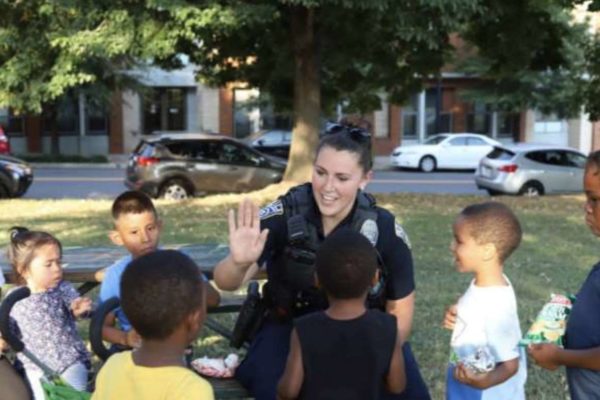
Arlington Public Schools and the Arlington County Police Department are hashing out their new working relationship following the School Board’s decision to remove School Resource Officers from school grounds.
Rather than place officers in school buildings, ACPD has formed an off-site Youth Outreach Unit tasked with developing engagement opportunities for and building relationships with kids. This summer, the Arlington School Board became the second in the region to remove SROs from school grounds out of concern for racial disparities in juvenile arrests.
While the new unit builds up its presence, ACPD and Arlington Public Schools are discussing their respective roles in maintaining school safety, which will be outlined in a new Memorandum of Understanding (MOU).
“We are meeting with the Youth Outreach Officers now to determine how they will interact with students and schools during the school year,” APS spokesman Frank Bellavia said. “We are also beginning the process developing the new MOU ACPD/APS MOU. As part of that process, we are creating focus groups with school-based staff and administrators to further discuss the future of our SRO relationship with the shared goals of best serving our students, schools, parents and the broader community.”
Work on the new MOU began on Aug. 30, according to APS. A final draft will be posted for review on Nov. 1, at which point the community will have 15 days to provide feedback on it.
Currently, ACPD’s Youth Outreach Unit has four corporals, two sergeants and a lieutenant who also oversees the Community Outreach Units, ACPD spokeswoman Kirby Clark said. Two team members were previously School Resource Officers.
“The [Youth Outreach Unit] team was selected following a standard internal process, open to all members of the department who hold the rank of officer or corporal,” Clark said.
The unit has fewer than half the 17 officers once assigned to the SRO unit, according to a March 2021 presentation.
Members were assigned to the unit in August and have started attending community events, including the Community Conversations with the Chief and the Arlington Police, Fire and Sheriff 9/11 Memorial 5K Race, Clark said.
“While attending community events and conducting proactive engagement on a daily basis, members of the Youth Outreach unit regularly seek to have meaningful conversations, answer questions, and build relationships with community members,” Clark said.
Feedback from the community conversations will inform the Youth Outreach Unit’s “specific programs, mission and objectives,” she said.
The unit is developing educational programming that could cover topics once addressed by SROs, such as Virginia’s legal system, internet safety, cyberbullying, dating safety and substance abuse. The unit also aims to partner with community groups and organizations to host relationship-building activities, such as sports.
“Given the very recent formation of the unit, specific programs and partnerships are still in development,” Clark said.
The unit and ACPD patrol officers will continue to respond to school-based incidents, which can be reported by calling the Emergency Communications Center at (703) 558-2222 — or 911 in an emergency, ACPD said last month. Non-emergency incidents can be reported through the Online Police Reporting System or by calling (703) 228-4300.
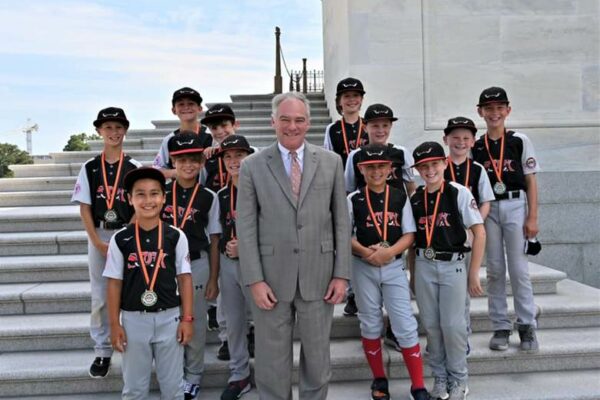
For the first time, a team of 9-year-old baseball players from the Arlington Babe Ruth League is going to the league’s version of the World Series.
The team, dubbed the Arlington Storm, is headed to Florida’s Treasure Coast today (Wednesday) to compete for the national title. The trip comes after winning the Virginia state championship and the Babe Ruth Southeast Regional Championship last week in Snow Hill, North Carolina.
“We’ve got some really good ball players, [and] they’re becoming really good teammates, most importantly,” said team captain Jeff Groharing, who is an attorney with the Department of Justice by day, and a baseball coach by morning (practice starts at 7:30 a.m. daily).
The boys will face several other teams from across the country in a series of games leading up to the championship on Thursday, Aug. 5.
“I’m burning up all my leave, but there’s no better way to spend it,” said Groharing, who says the kids have been having a whirlwind of a time since they won regionals.
After their victories the team received encouragement from Rep. Don Beyer and even visited the U.S. Capitol and met with Sens. Mark Warner and Tim Kaine.
“Getting attention from the Senators is neat for the boys,” Groharing said. “Both Senators Warner and Kaine seemed to enjoy spending time with the boys as well.”
Congratulations to Arlington's @arlstorm @ABRarlingtonBB Babe Ruth League all-stars, who became district champs, state champs, southeast regional champs, and now get to go to the Cal Ripken World Series, the farthest an Arlington team has ever advanced! We're rooting for you! pic.twitter.com/4d0D1jVf6R
— Rep. Don Beyer (@RepDonBeyer) July 20, 2021
Groharing started coaching the team when his son, who is on the team, was 7. He says parents love sending their kids to practice because they start their days early and learn values, such as teamwork and discipline.
“I don’t think they realize how much of an accomplishment it is for them to get it this far,” he said.
Arlington was well-represented down in Florida last weekend by another youth sports team. The Arlington Soccer Association’s team of 15-year-old boys won the U.S. Youth Soccer National Championships on Sunday, and three players received individual awards, we are told.
https://twitter.com/vayouthsoccer/status/1419712632794370057
https://twitter.com/arlingtonsoccer/status/1419711801030332421
Arlington County is asking residents how and when they use athletic fields.
The County’s Public Spaces Master Plan, adopted in April 2019, calls for a public survey every five years to garner feedback to determine how and when Arlingtonians use the available athletic fields.
The collected data will be used to update the permit process, availability of fields, and who has access when.
“We have a finite amount of park spaces,” Jerry Solomon, Community Engagement Manager for the Department of Parks and Recreation, writes to ARLnow in an email. “Our goal is to ensure we are using them as efficiently and effectively as possible. We need to determine if we are offering field spaces at times that people can best access them.”
Fields for adult soccer leagues, for example, are most needed outside of typical working hours. Baseball diamonds for Little League should be accessible when the players are, like on weekends or after school.
This survey will help make sure this is the case, plus provide additional data that may not be as self-explanatory.
The survey specifically asks about activity start and end times for different age groups as well, like if kids 9 and youngers should end their field use prior sundown on weekdays and who should have access to lighted fields.
In total, Arlington has 96 athletic fields — a mix of rectangular fields (35), diamond fields (42), and a combination of the two (19). That can be further broken down into lighted (37) and not lighted fields (59) as well as natural grass (80) and synthetic turf fields (16).
It probably doesn’t come as a surprise that the fields that have the most use on an individual basis are the lighted, synthetic turf fields. On average, each one of those fields gets more than 2,100 hours of play per year. This is compared to an average of 700 hours per non-lighted, natural grass field.
For years, which fields got lights has been a source of community contention.
Athletic field use in Arlington is often not a free-for-all or on a first-come, first-serve basis. Nearly all of the fields are either only accessible to permit holders or priority is given to permit holders.
Only six of the 96 athletic fields in Arlington are available as drop-in fields, or “community fields.” Even those, though, can be reserved for scheduled programs or practices.
That has drawn the ire of some residents, like those who live near Pentagon City and want to see one or both of the softball diamonds at Virginia Highlands Park opened up for community use.
There’s even a tiered priority system for the allocation of permits, which was first recommended in 2016 due to an “inequity” that existed in how fields were allocated.
Arlington Public Schools are given first priority, then county-organized non-profit youth sport leagues, then adult leagues, then for-profit sports leagues, and, finally, individual rentals or other organizations.
Some fields also have agreements with local universities for their use.
All of this, plus Arlington’s growing population, is resulting in heavy use and demand for athletic fields. According to the PSMP, the county could need an additional 11 rectangular and 2 diamond fields by 2035 to maintain the current levels of use and access.
The hope is that the survey and public feedback will allow for better, more efficient, and more fair use of the limited field space.
This survey will be open until the end of the month, says Solomon, at which point DPR will review and report findings to the Public Spaces Master Plan Implementation Committee in the spring.
There could be more opportunities to provide feedback come the spring and summer, Solomon noted.
The Arlington County Department of Parks and Recreation is asking residents if they would attend indoor programs and classes this winter.
In an email sent yesterday, the parks department announced that as staff prepare for winter, they are exploring opportunities for safe indoor classes and programs.
The survey asks whether residents are comfortable attending or sending children to indoor programming, or whether they would rather stick with virtual activities.
“It’s really to take folks’ temperature,” spokeswoman Susan Kalish said.
Whether the department hosts programs this winter is “not up to us — it’s up to the guidelines,” she said, referencing state health guidelines.
One guideline in Phase 3 of Gov. Ralph Northam’s Forward Virginia plan, initiated in August, tells establishments to keep 10 feet of distance between attendees when exercise activities, singing or cheering are involved. In all other settings, the minimum distance required is six feet.
Program sizes will be smaller and in some cases, due to constraints, particular classes may not be viable, Kalish said.
Community centers will have one-way entrances and exits, be reconfigured and cleaned more frequently, the email said.
Options for physical activities range from gymnastics to therapeutic adapted services, and other suggested topics for programming include history, music, science and discovery, languages and nature.
The parks department continues to offer virtual programs for people of all ages, abilities and interests. For now, the department said outdoor spaces are open and it continues to run “Programs in the Park (while the weather is good).”


